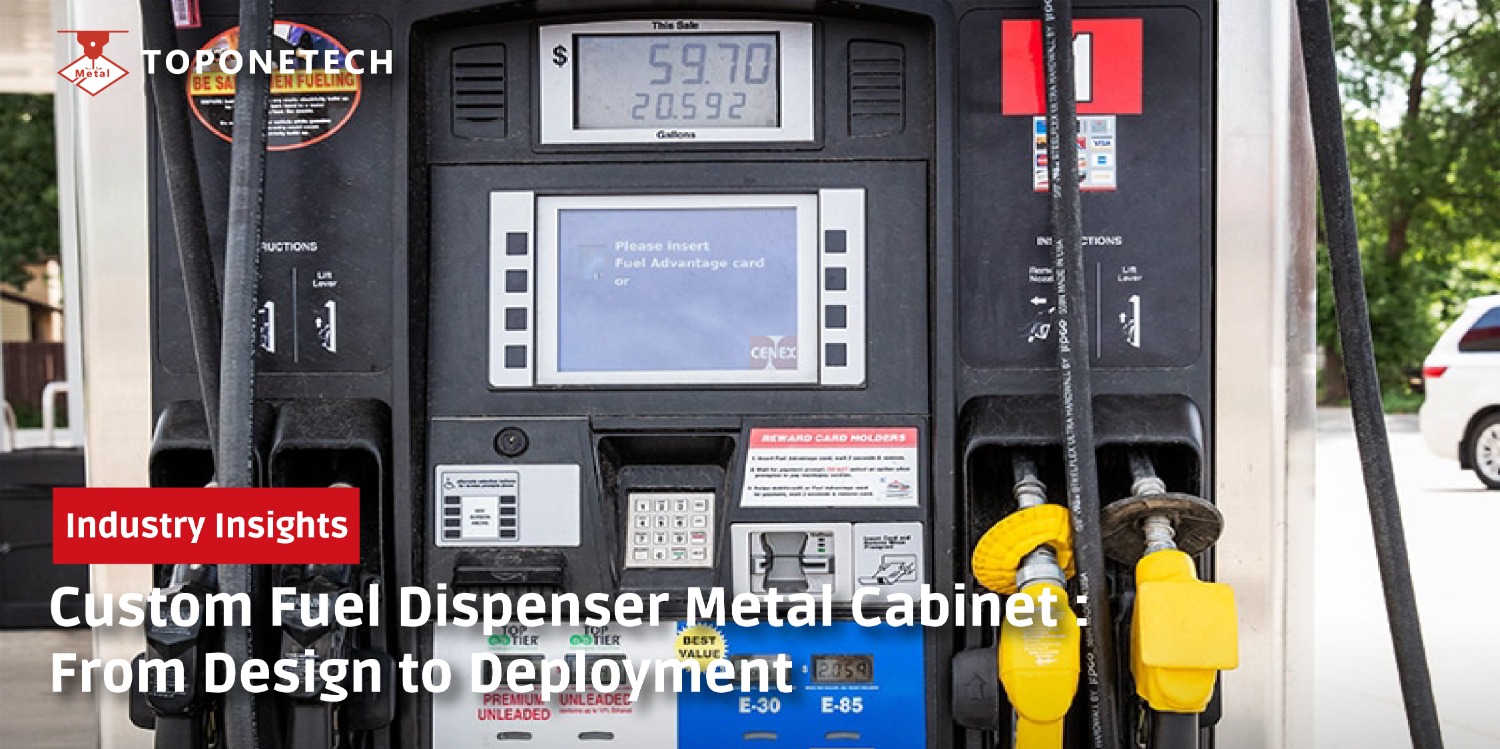
In today’s world, where technological advancements are moving at an unprecedented pace, safeguarding sensitive equipment is more crucial than ever. Whether you’re in industrial manufacturing, telecommunications, or IT, the integrity of your devices and equipment is vital to ensuring operational efficiency and longevity. Enter the sheet metal enclosure—a practical, durable, and efficient solution designed to protect your equipment from environmental and physical damage.
Introduction to Sheet Metal Enclosure
A sheet metal enclosure is a protective casing used to house electrical, mechanical, and other sensitive equipment. These enclosures are designed to shield the equipment from environmental factors such as dust, moisture, and temperature fluctuations, as well as protect them from physical damage. Whether used in industrial settings, telecommunications, or consumer electronics, sheet metal enclosures play a crucial role in maintaining the integrity and performance of the equipment they protect.
As businesses and industries increasingly rely on technology and automation, the demand for robust and reliable enclosures has risen. Sheet metal enclosures, known for their strength, versatility, and customization options, have become the go-to solution for a wide range of applications. In this article, we will explore the different types of sheet metal enclosures, their benefits, and why they are essential for protecting your equipment.
Types of Sheet Metal Enclosure
There are various types of sheet metal enclosures available, each tailored to specific needs and applications. Moreover, understanding the different types will help you choose the right enclosure for your equipment.
1. Electrical Enclosures
Electrical enclosures are designed to house electrical components, wiring, and controls. They protect the equipment from external elements like water, dust, and corrosive materials, ensuring safe operation. These enclosures are commonly used in industries such as manufacturing, energy, and telecommunications.
2. Server and Network Enclosures
For IT infrastructure, sheet metal enclosures are essential for organizing and protecting servers, networking equipment, and other data systems. These enclosures not only protect the hardware from physical damage but also help with cable management and temperature control through integrated cooling systems.
3. Industrial Enclosures
Industrial enclosures are used to protect machinery, control panels, and instrumentation in harsh environments such as factories, plants, and outdoor locations. Moreover, they are built to withstand extreme conditions, including high temperatures, heavy vibrations, and exposure to chemicals.
4. Custom Enclosures
For businesses with unique requirements, custom sheet metal enclosures can be designed and fabricated to meet specific dimensions, material needs, and design preferences. Moreover, these enclosures are tailored to the exact specifications of the equipment and the environment in which it operates.
Benefits of Using Sheet Metal Enclosure
The advantages of using sheet metal enclosures are numerous, and they extend beyond simple protection. Furthermore, here are some key benefits:
1. Durability and Strength
Sheet metal enclosures are incredibly durable and can withstand significant impact, ensuring that the equipment inside remains safe even in rugged conditions. They provide a sturdy barrier against physical damage, such as bumps, knocks, or falling objects.
2. Environmental Protection
These enclosures offer excellent protection against environmental factors like dust, moisture, and temperature fluctuations. Moreover, many enclosures are built to meet industry standards for ingress protection (IP ratings), ensuring that they can resist water, dust, and other harmful elements.
3. Thermal Management
Certain equipment, such as servers and industrial machinery, generates a lot of heat. Furthermore, sheet metal enclosures can be designed with ventilation systems, fans, or heat sinks to dissipate heat and maintain an optimal temperature, preventing overheating and ensuring smooth operation.
4. Versatility in Design
Sheet metal enclosures can be easily customized in terms of size, shape, and material, making them suitable for a wide range of applications. Moreover, this versatility allows businesses to create enclosures that perfectly fit their equipment and specific environmental conditions.
5. Security
Security is a key concern when it comes to sensitive equipment. Moreover, sheet metal enclosures can be fitted with locks, reinforced doors, and other security features to prevent unauthorized access, ensuring that your equipment remains protected from tampering or theft.
Industries That Rely on Sheet Metal Enclosure
Many industries rely heavily on sheet metal enclosures to safeguard their equipment and ensure operational continuity. Furthermore, some of these industries include:
1. Telecommunications
Telecommunications equipment, such as signal transmitters, servers, and networking devices, often requires protection from external elements. Sheet metal enclosures provide the necessary protection while also offering cable management and ventilation features.
2. Manufacturing
In manufacturing, machinery and control panels are critical to production processes. Moreover, industrial sheet metal enclosures help protect this equipment from dust, moisture, and mechanical damage, ensuring smooth and efficient operation.
3. Energy and Utilities
Power generation and distribution equipment is often exposed to harsh environmental conditions. Furthermore, sheet metal enclosures help protect transformers, control systems, and other critical components from weather, dust, and corrosion.
4. Medical and Healthcare
In the healthcare industry, sensitive electronic devices and medical equipment need to be shielded from environmental factors. Sheet metal enclosures are used to protect devices such as imaging machines, laboratory equipment, and monitoring systems, ensuring they operate reliably.
Customization Options for Sheet Metal Enclosure
One of the biggest advantages of using sheet metal enclosures is the ability to customize them to fit specific needs. Furthermore, customization options include:
1. Sheet Metal Enclosure Size and Dimensions
Manufacturers can fabricate sheet metal enclosures in any size or shape, ensuring they fit the equipment perfectly and maximize space efficiency.
2. Material Selection
Manufacturers can use different materials for the enclosures, including steel, aluminum, and stainless steel. The choice of material depends on factors such as environmental conditions, weight requirements, and cost.
3. Finish and Coatings
You can customize the finish of the enclosure with various coatings, such as powder coating or galvanization, to improve corrosion resistance and aesthetic appeal. Coatings also enhance durability and provide an additional layer of protection against environmental factors.
4. Mounting Options
Manufacturers can create sheet metal enclosures with various mounting options, including wall-mounted, floor-standing, or rack-mounted configurations, depending on the installation requirements.
Materials Used in Sheet Metal Enclosure
The choice of material is crucial in determining the strength, weight, and corrosion resistance of the sheet metal enclosure. Furthermore, common materials used include:
1. Steel
People recognize steel for its durability and strength, making it a popular choice for industrial and heavy-duty applications. Moreover, these enclosures provide excellent protection against impact and often withstand harsh environments.
2. Aluminum
Aluminum is lightweight yet strong, making it ideal for applications where weight is a concern. It also has natural corrosion resistance, making it suitable for outdoor use or environments with high humidity.
3. Stainless Steel
Stainless steel offers superior corrosion resistance and is often used in environments where hygiene and cleanliness are paramount, such as in food processing, medical equipment, and pharmaceutical industries.
The Manufacturing Process of Sheet Metal Enclosure
The manufacturing process of sheet metal enclosures involves several stages, from design to fabrication. Furthermore, key steps include:
1. Sheet Metal Enclosure Design and Prototyping
The process begins with the design phase, where engineers create detailed specifications for the enclosure. Furthermore, engineers use computer-aided design (CAD) software to create a prototype that they can test and refine.
2. Cutting and Shaping
Once the design is finalized, the sheet metal is cut and shaped using tools such as laser cutters, CNC machines, and bending machines. Precision is critical during this stage to ensure that the enclosure meets the exact dimensions.
3. Welding and Assembly
The manufacturer then welds or fastens the individual components of the enclosure together. Moreover, high-quality welding ensures that the enclosure is structurally sound and can withstand environmental and physical stresses.
4. Finishing and Coating
After assembly, manufacturers apply coatings or paint to the enclosure to enhance its appearance and protect it from corrosion. This step is especially important for enclosures that will be used in outdoor or corrosive environments.
5. Quality Control
The final step in the manufacturing process is quality control. Furthermore, inspectors examine the enclosure for any defects or inconsistencies and test it to ensure it meets industry standards for strength, durability, and protection.
Why You Need a Sheet Metal Enclosure for Your Equipment
Investing in a high-quality sheet metal enclosure is essential for several reasons:
1. Equipment Longevity
By protecting your equipment from environmental factors and physical damage, sheet metal enclosures extend the lifespan of your devices, reducing the need for frequent repairs or replacements.
2. Safety
Sheet metal enclosures prevent electrical hazards by keeping live components enclosed and reducing the risk of accidental contact or short circuits.
3. Operational Efficiency
Protecting your equipment ensures that it continues to operate at peak efficiency. Downtime caused by equipment failure can be costly, but sheet metal enclosures help minimize these risks.
4. Compliance with Industry Standards
Many industries set specific safety and operational standards that companies must meet. Furthermore, manufacturers often create sheet metal enclosures to comply with these regulations, ensuring that your equipment is safe and up to code.
Choosing the Right Sheet Metal Enclosure: Key Factors
When selecting a sheet metal enclosure, consider the following factors:
1. Environment
In what kind of environment will you use the enclosure? Consider factors such as temperature, humidity, exposure to chemicals, and whether the enclosure will be indoors or outdoors.
2. Size and Dimensions
Ensure that the enclosure is the correct size for your equipment and provides enough space for ventilation and cable management.
3. Sheet Metal Enclosure Material
Choose the right material based on the enclosure’s intended use. Additionally, steel offers strength, aluminum provides lightweight durability, and stainless steel offers excellent corrosion resistance.
4. Sheet Metal Enclosure Security Features
If your equipment is sensitive or valuable, consider enclosures with additional security features such as locks, reinforced doors, or tamper-proof designs.
Maintenance and Care for Sheet Metal Enclosure
To ensure the longevity of your sheet metal enclosure, regular maintenance is essential:
1. Sheet Metal Enclosure Regular Cleaning
Keep the enclosure clean to prevent the buildup of dust and debris, especially in environments with high levels of particulate matter.
2. Inspect for Damage
Regularly inspect the enclosure for signs of wear, rust, or damage, and address any issues promptly to avoid further deterioration.
3. Check Seals and Gaskets
Ensure that any seals or gaskets are in good condition to maintain protection against moisture, dust, and other contaminants.
4. Lubricate Hinges and Locks
If your enclosure has moving parts such as hinges or locks, lubricate them regularly to prevent rust and ensure smooth operation.
Conclusion: Invest in Long-Lasting Protection
In conclusion, in an increasingly technology-driven world, protecting your equipment is essential for maintaining productivity, safety, and longevity. Furthermore, sheet metal enclosures offer a durable, customizable, and versatile solution to safeguard your devices against environmental and physical threats. Whether you’re in telecommunications, manufacturing, energy, or healthcare, the right sheet metal enclosure can provide peace of mind, knowing that your equipment is secure and operating at its best.
When choosing a sheet metal enclosure, consider your specific needs and invest in high-quality materials and designs that will stand the test of time. Finally, proper maintenance and care will ensure that your enclosure continues to protect your valuable equipment for years to come.
Top One Tech can customize Sheet Metal Enclosures, specially designed for your application scenarios.
Contact us for further information :
Whatsapp/Call us at : +86 13631610695
Email : sales@toponetechmetal.com
See Also : Our Wide Range of Sheet Metal Products



